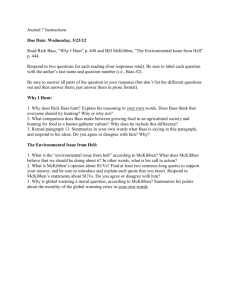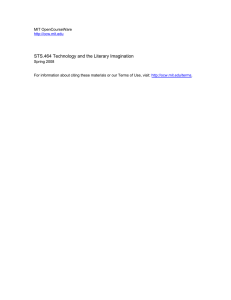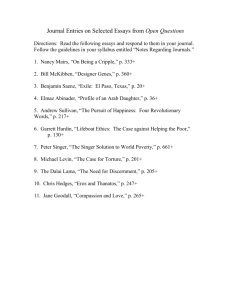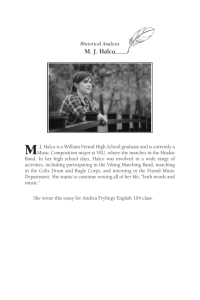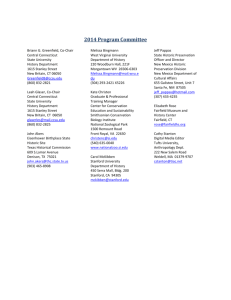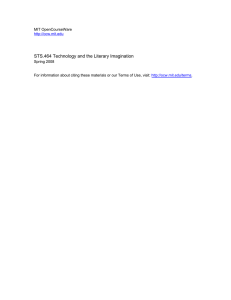STS.464 Technology and the Literary Imagination
advertisement
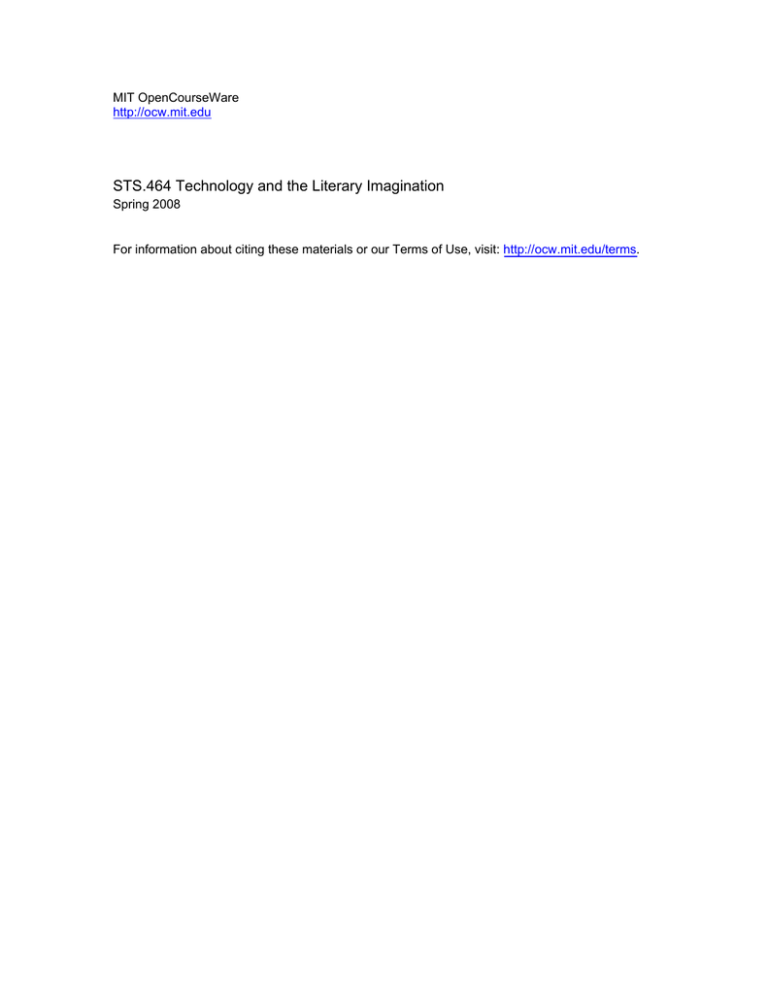
MIT OpenCourseWare http://ocw.mit.edu STS.464 Technology and the Literary Imagination Spring 2008 For information about citing these materials or our Terms of Use, visit: http://ocw.mit.edu/terms. Lisa Crystal STS 464 May 23, 2008 Technology, Nature, and the Loss of Meaning 1. Introduction In The End of Nature, Bill McKibben argues that, by contaminating the atmosphere with greenhouse gases, we humans have permanently altered our relationship with the planet. While there was a time when the impact we had on the earth was local, affecting only areas in close proximity to our actions, it has now become global: by altering the atmosphere we have changed the entire globe. For McKibben, the emergence of this new global category of pollution, an event he describes as “the transition from ‘traditional’ pollutants to these new horrors [greenhouse gasses] whose cause and effects are everywhere,” (McKibben, 30) is a cause for concern in several respects. In the most practical sense, it is a threat to our planet - both to the earth in and of itself, which McKibben believes, borrowing from deep ecology, is intrinsically valuable, and to the earth as a sustainable habitat for future generations of humans. But it is more than just a threat to our planet: McKibben locates a psychological and spiritual crisis in the pollution of the atmosphere. McKibben refers to the psychological and spiritual crisis engendered by the new global pollution as “the end of nature.” Before proceeding further, I should mention that McKibben’s use of the word “nature” is idiosyncratic. That is, McKibben does not use the word “nature” to refer to natural processes, but rather uses it to describe a human conception of the world. He writes: “when I say nature, I mean a certain set of human ideas about the world and our place within it” (McKibben, 7). These ideas amount to an understanding of nature as a “separate and wild province, the world apart from man to which he was adapted, under whose rules he was born and died” (McKibben, 41). It is this idea – the separateness of nature that, for McKibben, is the meaning of nature itself – that is the ultimate victim of global pollution. For McKibben, there are at least two distinct reasons why the contamination of the atmosphere threatens nature’s separateness. First, in a purely spatial sense, the pollution of the atmosphere means that we have altered “every inch and every hour of the globe” (McKibben, 39). There is no longer anywhere on the planet that exists as it would have had humans never inhabited this planet, not an inch that does not bear our mark. It follows that it is difficult to conceive of anywhere as being independent of us. Second, the greenhouse gasses we have released into the air have changed the weather; thus, by changing the weather, we have eliminated the possibility that the weather results from a force that transcends us. Our recognition of the absence of untouched regions of the globe, coupled with our inability to understand nature, as embodied in the weather, as something independent of us, signals something terrifying for McKibben: we are all alone. Without nature, “that world entirely independent of us which was here before we arrived and which encircled and supported our human society” (McKibben, 82), we are faced with the possibility that nothing lies outside of ourselves. Yet why is the absence of anything outside of the realm of the human such a scary thought for McKibben? Why, in his opinion, is “the end of nature” a bad thing? Perhaps it is because the notion of a transcendent nature brings to our lives the possibility of security, stability, and meaning. Nature, for McKibben, functions like God, a fact from which he does not shy away: he writes that he has overcome “the crisis of belief […] by locating God in nature” (McKibben, 61). Therefore, in his account, the end of nature becomes equivalent to the death of God, or else the death of the metaphysical comfort that the idea of God can provide. McKibben views a life without the comfort of some form of divinity as undesirable, to put it mildly. For if our experiences cannot be understood in relation to a transcendent force, these experiences, including our suffering, have no meaning. McKibben glimpses the possibility of nihilism in the end of nature, and this possibility, understandably, unsettles him. I will argue that McKibben’s problem with the end of nature results from two distinct, though not unrelated implications: the absence of control and the absence of meaning in human life. From McKibben’s standpoint, control and meaning could either come from us or from God/nature. The end of nature eliminates the possibility of the latter source, yet in doing so it also leaves no room for the former. McKibben’s discussion of the weather brings out just how the end of nature removes all possibilities for control and meaning in our lives. He writes that, in the wake of global warming, “the temperature and rainfall are no longer the work of some separate, uncivilizable force, but instead in part a product of our habits, our economies, our ways of life” (McKibben 40). Yet although we can no longer attribute the weather to some separate, uncivilizable force, which is to say to some form of God, neither can we directly attribute the weather to ourselves; we have not become Gods. McKibben writes that when he first registered the fact that humans have affected the weather, which he had always regarded as a ‘natural’ process, he felt he “had no more control, in one sense, over this process than [he] ever did” (McKibben, 76). Without giving us the power to decide whether or not it is going to rain, the end of nature has nevertheless eliminated the possibility that something else sovereignly dictates the weather. And just as, in McKibben’s account, the end of nature removes the possibility that anything or anyone controls the weather, so too does it deprive the weather of all sources of meaning. He writes that “[…] the meaning of the wind, the sun, the rain – of nature – has already changed. Yes, the wind still blows – but no longer from some other sphere, some inhuman place” (McKibben, 41). The independence, the “inhumanity” of nature, is its meaning for McKibben (McKibben, 50). Global warming signals the loss of all sources of control and meaning, forcing us to face the possibilities of randomness and nihilism. Yet there is something paradoxical about this uncomfortable and scary situation to which McKibben draws attention. Which is to say, the loss of control and meaning seem to result almost directly from our efforts to take control of, and find meaning in, our lives. It is a paradox that belongs to what we now, in the twentieth century, refer to as technology: “technology,” the means and practices by which we attempt to control, regulate, and manipulate the world around us, can engender feelings of helplessness. Or, to formulate this paradox in terms of “meaning,” the search for meaning brings us face to face with meaningless. And if, with McKibben, one agrees that meaninglessness and lack of control are undesirable, it would seem that the quest for control and meaning - the technological mindset - must be abandoned altogether. McKibben’s way of abandoning this technological mentality is to regard the earth as divine, to behave as though nature is an external, cosmic force, as well as a transcendent source of meaning. Yet McKibben is not the first thinker to notice, and recoil from, the above-mentioned paradox. Even before the word technology was available, many thinkers wrote about how our drive to control the world can leave us feeling helpless, as well as how the attempt to regulate and manipulate the world can deprive us of our spiritual possibilities. In sections 2 and 3 I will therefore discuss how several such thinkers, beginning with Thomas Carlyle, have treated the interrelated problems surrounding power, spirituality, helplessness, and nihilism. 2. The Emergence of A Technological Paradox In “Signs of The Times,” Thomas Carlyle worries that the new ‘mechanical’ mindset may cause people to neglect, or even to forget altogether, the more spiritual, meaningful aspects of human existence. For Carlyle, these aspects belong to inward life, to something resembling the idea of ‘soul,’ and include spirituality, individuality, and creativity. Carlyle describes inward life in terms of “the primary, unmodified forces and energies of man, the mysterious springs of Love, and fear, and Wonder, of Enthusiasms, Poetry, Religion, all of which have a truly vital and infinite character” (Carlyle, 448-449). He describes this inward life as a “free gift of Nature”: it is our human nature given to us by God, the part of human existence that participates in something larger than humanity. Carlyle finds God and nature inside the human, in the ‘soul’. Yet, expressing a wariness similar, in many respects, to McKibben’s, he also believes that mechanization – the attempt to control and regulate nature – deprives human existence of its natural inwardness: deprives it, in other words, of its divinity. Mechanization, for Carlyle, threatens the ideas of God and soul, as well as the meaningfulness that comes with these ideas. In Carlyle, we find an early expression of the fear that the human drive toward the regulation of experience will deprive that experience of all that is meaningful and valuable. Timothy Walker, in “Defence of Mechanical Philosophy,” provides the counterargument to Carlyle’s claims. Walker believes that progress in the mechanical arts will generate increased human happiness and leisure time. Walker believes God has given us the ability to control our surroundings to better serve our needs, and that it would deny us our God-given capabilities if we were to restrain ourselves from doing so. Walker does not see our efforts to control the world as depriving human existence of meaning; rather, for him, mechanization and industrialization are meaning-granting: by capitalizing upon our God-given faculties, mechanization allows us greater leisure and freer contemplation. Admittedly, Walker and Carlyle wrote these two pieces in 1829, well before some of the more apocalyptic possibilities of human technological progress – such as global warming and nuclear warfare – became realistic possibilities. Yet even without such devastating events looming over their discourse, their opposed positions bring out part of the paradox that comes with the more modern concept of technology quite clearly: the human effort to control the world can both generate and remedy meaninglessness. Herman Melville, in his 1851 masterpiece Moby Dick, focuses more explicitly on the loss of self-control that accompanies the human effort to dominate nature. Through captain Ahab’s quest to conquer and kill Moby Dick, Melville brings out many of the nuances and contradictions that accompany the impulse to control the world. Ahab’s monomaniacal quest illuminates how the drive to control experience eliminates the possibility of all control. Ahab’s pursuit of the whale becomes an effort to conquer and eradicate the cause of his suffering, to exercise agency in an unpredictable and merciless world. Yet, as the novel progresses, Ahab increasingly feels as though he has lost control over the chase, as though he could not abandon it even if he wanted to. Through his desperate effort to exercise agency he is left feeling virtually helpless. By the end, he doubts whether he has any control over his actions at all. In ‘The Symphony,’ the final chapter before the chase, Ahab wonders “What is it, what nameless, inscrutable, unearthly thing is it; what cozening, hidden lord and master, and cruel remorseless emperor commands me […]? Is Ahab Ahab? Is it I, God, or who, that lifts this arm?” (Melville, 507). Ahab’s effort to take control of the cause of his suffering leaves him feeling as though he has no control over the world outside of him or himself. The result – the ending of the book – is devastating: Ahab’s effort to take control of his fate, to force a degree of meaning and purpose into his life, ultimately, despite himself, brings about his destruction. The feeling of helplessness generated by human action becomes all too apparent in the light of the devastation wreaked by the atomic bombs dropped on Japan in August, 1945. In the wake of these events, it is tempting to view human beings as the victims of technology, or at least as the victims of its collateral effects. With Hiroshima and Nagasaki, we see that human efforts to control and manipulate the world can have terrible effects that cannot be controlled. In John Hersey’s account of the reactions of the survivors of the bombing of Hiroshima, he subtly emphasizes how helpless and confused they felt about what had happened to them. How can anyone make sense of such a disaster, especially when the disaster is humanly caused, although the extent of its impact not entirely planned for? Hiroshima crystallizes the contradictory nature of technology: humans have created means for gaining control of the world that they are unable to completely control. The result is that we cannot entirely blame human intentionality for the things that happen to us, because we could not have foreseen them; but at the same time it is impossible to attribute the things we suffer to something else. Technology brings us face to face with a metaphysical void, providing us with no means to explain randomness and suffering. If what we desire is comfort, it seems we need to look past technology to find it. 3. The Place of Metaphysics The above-mentioned literature draws attention to the human need for a form of metaphysics to provide comfort and give sense and meaning to our actions and experiences. As many authors have illustrated, this metaphysical comfort need not come from a rigorously grounded notion of religion or God - it could come simply from the suspicion that there is something or someone outside of us that is watching out for us and taking care of us. For example, in Sarah Orne Jewett’s The Country of the Pointed Firs, Mrs. Todd’s presence as herbalist is able to provide the residents of Dunnet Landing with a degree of this form of comfort. The narrator writes of the herbs in Mrs. Todd’s garden: “Some of these might once have belonged to sacred and mystic rites, and have had some occult knowledge handed with them down the centuries” (Orne Jewett, 8). The mystique that surrounds Mrs. Todd’s herbs, along with the authority and care with which she administers them, is able to provide comfort to those who fear for their lives or the lives of their children. Or else consider Ishmael’s final insight in Moby Dick, when he concludes that happiness and satisfaction are not to be found in the drive for control and understanding of nature, but rather in the everyday security of life on land with the people in one’s life. Ishmael comes to the realization that “[…] in all cases man must eventually lower, or at least shift, his conceit of attainable felicity; not placing it anywhere in the intellect of the fancy; but in the wife, the heart, the bed, the table, the saddle the fire-side the country […]” (Melville, 398). Finally, as mentioned above, Bill McKibben’s The End of Nature looks for metaphysical comfort in the idea of nature as separate and divine. Yet, of all the aforementioned sources of comfort, I find McKibben’s idea of nature the most problematic. For can nature be something independent of us, that gives meaning to our lives, simply because we want it to be? McKibben’s insight, that the unchecked human drive to control and manipulate world counters human purposes when it comes to spiritual comfort, is something that has been observed by many thinkers before him. Yet the solution to this problem that he presents in The End of Nature – the deep ecological solution whereby we value the earth over ourselves and adjust our habits accordingly – is ultimately unsatisfactory. For McKibben provides no reason for why the earth should be valued independent of us, other than his weak metaphysical claim that he locates God in nature, and his psychological claim that the absence of an independent nature is upsetting. His argument implies that, in order to avoid being upset, we should follow him in regarding and respecting nature as divine, thereby restoring to nature its emotional and spiritual power as a source of “inhuman” comfort. Yet if a reader does not accept the divinity that McKibben finds in nature, on what grounds should she accept the remainder of his argument? 4. Conclusion Bill McKibben’s End of Nature provides valuable insight into the problems associated with living in a technological world. The paradox associated with technology, that taking control of the world in order to combat helpless could leave humans feeling even more helpless than before, does not provide much room for meaningful explanations of experience and suffering. As I have shown, this position has been the concern of many writers in the past, even before the more obviously negative effects of technology – such as nuclear warfare and climate change – were conceivable, and even before the word technology, with its current meaning and connotations, was available. Further, many writers have proposed various ways, outside of the technological mindset, in which humans can find the comfort of which technology deprives them. McKibben’s proposal, however, that we need to reinvest nature with divine independence, is ultimately problematic: the meaning of an independent nature is compromised if it is only meaningful and independent because we need it to be.

